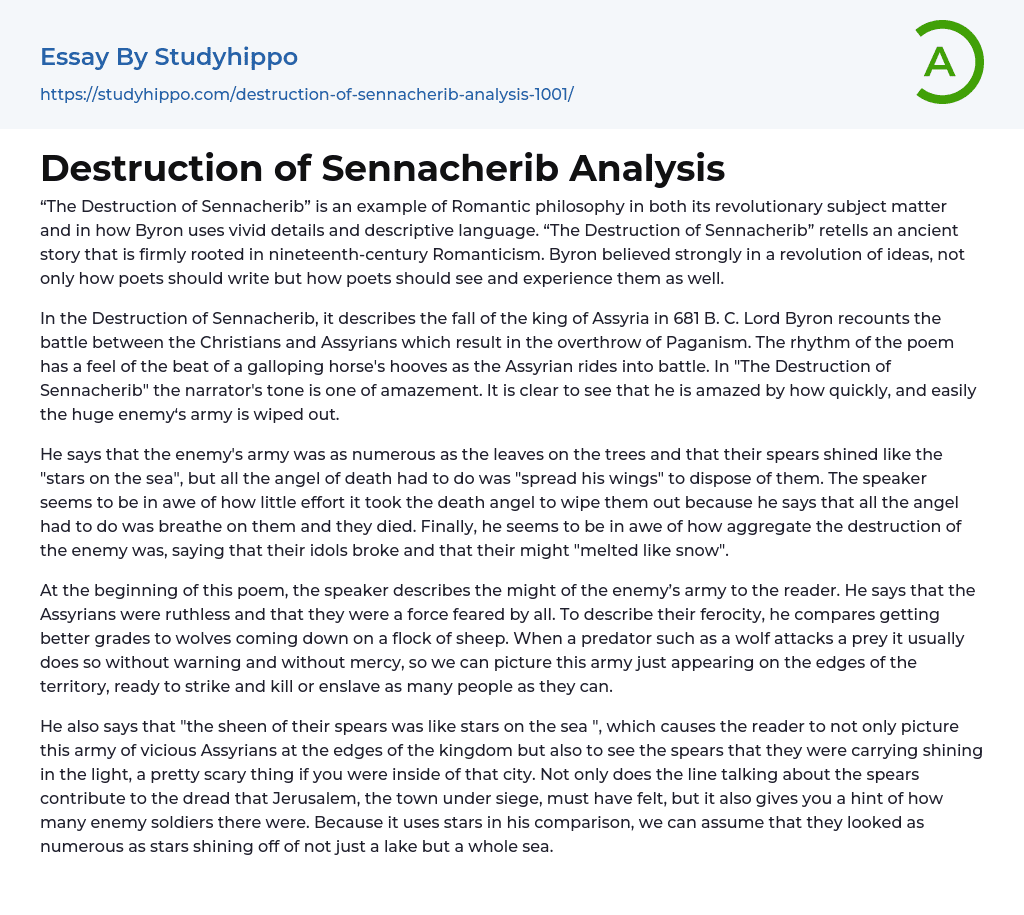“The Destruction of Sennacherib” is an example of Romantic philosophy in both its revolutionary subject matter and in how Byron uses vivid details and descriptive language. “The Destruction of Sennacherib” retells an ancient story that is firmly rooted in nineteenth-century Romanticism. Byron believed strongly in a revolution of ideas, not only how poets should write but how poets should see and experience them as well.
In the Destruction of Sennacherib, it describes the fall of the king of Assyria in 681 B. C. Lord Byron recounts the battle between the Christians and Assyrians which result in the overthrow of Paganism. The rhythm of the poem has a feel of the beat of a galloping horse's hooves as the Assyrian rides into battle. In "The Destruction of Senna
...cherib" the narrator's tone is one of amazement. It is clear to see that he is amazed by how quickly, and easily the huge enemy‘s army is wiped out.
He says that the enemy's army was as numerous as the leaves on the trees and that their spears shined like the "stars on the sea", but all the angel of death had to do was "spread his wings" to dispose of them. The speaker seems to be in awe of how little effort it took the death angel to wipe them out because he says that all the angel had to do was breathe on them and they died. Finally, he seems to be in awe of how aggregate the destruction of the enemy was, saying that their idols broke and that their might "melted like snow".
At the beginning of this poem, the speaker describes the might of the enemy’s army
to the reader. He says that the Assyrians were ruthless and that they were a force feared by all. To describe their ferocity, he compares getting better grades to wolves coming down on a flock of sheep. When a predator such as a wolf attacks a prey it usually does so without warning and without mercy, so we can picture this army just appearing on the edges of the territory, ready to strike and kill or enslave as many people as they can.
He also says that "the sheen of their spears was like stars on the sea ", which causes the reader to not only picture this army of vicious Assyrians at the edges of the kingdom but also to see the spears that they were carrying shining in the light, a pretty scary thing if you were inside of that city. Not only does the line talking about the spears contribute to the dread that Jerusalem, the town under siege, must have felt, but it also gives you a hint of how many enemy soldiers there were. Because it uses stars in his comparison, we can assume that they looked as numerous as stars shining off of not just a lake but a whole sea.
- Boo Radley essays
- Genesis essays
- Richard iii essays
- Alice in Wonderland essays
- On the road essays
- Ozymandias essays
- The Nightingale essays
- Holden Caulfield essays
- Animal Farm essays
- 1984 essays
- A Hanging essays
- Shooting An Elephant essays
- A Tale Of Two Cities essays
- Adventures Of Huckleberry Finn essays
- Arthur Conan Doyle essays
- Brave New World essays
- Characters In Hamlet essays
- Characters In Romeo And Juliet essays
- Desdemona essays
- Diary Of A Wimpy Kid essays
- First-Person Narrative essays
- Frankenstein essays
- Heart Of Darkness essays
- Jane Eyre essays
- Jay Gatsby essays
- King Duncan essays
- Librarian essays
- Little Red Riding Hood essays
- Lord Of The Flies essays
- Silas Marner essays
- The Cask Of Amontillado essays
- The Catcher In The Rye essays
- The Crucible essays
- The Handmaid's Tale essays
- The Reader essays
- Virgil essays
- Wuthering Heights essays
- Candide essays
- Castle essays
- J. D. Salinger essays
- Ulysses essays
- Ethan Frome essays
- In Cold Blood essays
- Outliers essays
- Tuesdays With Morrie essays
- The Art of War essays
- Wife of Bath essays
- Huckleberry Finn essays
- The Lady With The Dog essays
- Great Expectations essays




